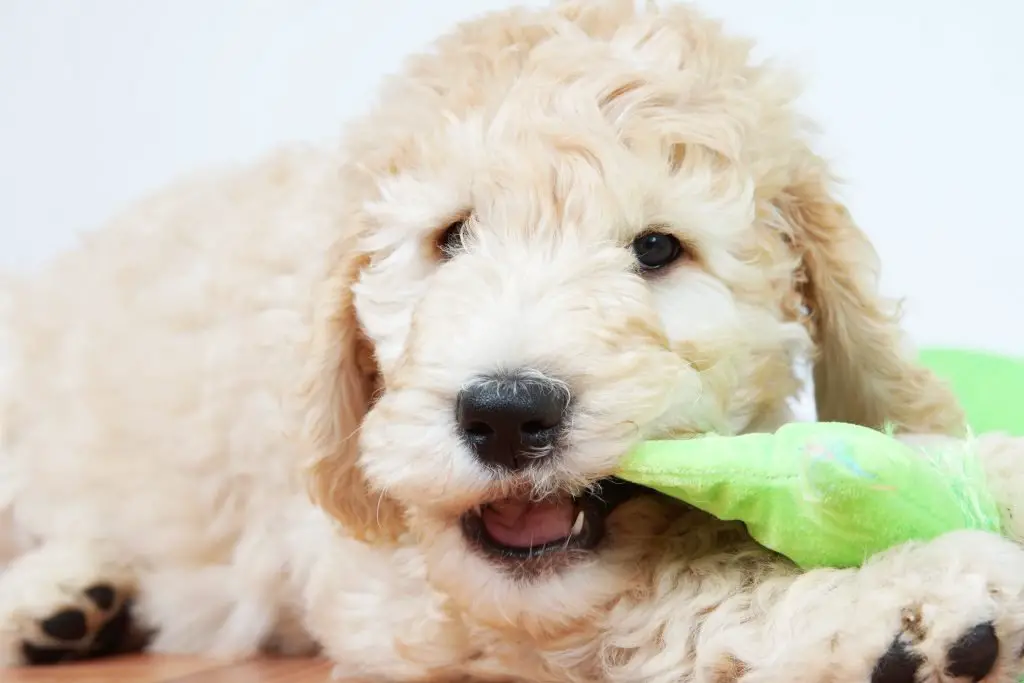Goldendoodle puppies are adorable and playful creatures. But like with any puppy playtime can quickly turn into a nipping, chewing free for all that can leave you feeling like a chew toy.
Goldendoodles puppies usually bite because of teething and as a form of play. Older dogs may bite due to aggression or habit. Biting and chewing should be discouraged at an early age to prevent unwanted behavior.
From exploring surroundings and humans to overcoming stress and boredom, the Doodle’s mouth happens to be one that never seems to tire out. The key to stopping this unwanted behavior is understanding why Goldendoodles bite and how to discourage, and if possible, inhibit them from doing so without being harsh.

Reasons Why Goldendoodles Bite
Every pet owner needs to accept that the pup will start to bite and chew at some point. Earlier on, it might just nip playfully at you, which comes across as rather cute and ticklish.
However, the nipping soon turns into full-fledged bites, which could hurt and are not so pleasant anymore. At this point, pet owners start wondering why their adorable fur balls bite/chew.
Looking at the Goldendoodles’ parental history, it becomes quite apparent why they tend to bite/chew. Both parents – the poodle and the Golden Retriever – excelled at retrieving things from the water or anywhere else, so it is simple to comprehend why Doodles like to use their mouth as often as they do.
Goldendoodles Bite While Playing
The simplest explanation is that this is how Goldendoodles play. Whether it is a human or any other animal, nipping and biting form an integral part of the game and should be taken sportingly. In the process, if the Doodle gets hurt, it will most likely yelp and expect to be persuaded.
However, when you get hurt, be prepared for your Doodle to take it as a victory and assume dominance as the pack’s alpha leader.
How would you react? Please take it in your stride, start training your Doodle to bite/chew as part of the play, and resort to other games instead.
Puppies Chew When Teething
Like human babies, Goldendoodles also go through a teething phase. An eruption of new teeth is often accompanied by an itching sensation in the gums, which the pup tries to relieve by biting.
Constant itching can be quite irritating, so it would be unfair to blame the puppy for seeking relief, even though it implies biting everything in sight.
To help your pup, provide it with plenty of chewable toys, stuffed or otherwise. Teethers full of water are also good options as the Doodle can keep biting at it and experience satisfaction and relief.
You can even improvise by filling a sock full of stuff and letting your Doodle have a go at it. Alternatively, give them an empty bottle that rolls around and can be chewed at without suffering any significant damage.
Biting Can Be an Aggressive Behavior
By nature, Goldendoodles are not aggressive unless indicated by you as the pet owner that they can get away with it. When that happens, Doodles tend to bite every time they don’t get their way, like when you refuse to play with them or skip on taking them out, or even when you take their toys away to settle them down.
Given that dogs are pack animals, aggression is an innate trait. However, the good news is that it can just as easily be controlled through early training and positive reinforcement. To this effect, aggressive biting can be maintained at the puppy stage or even later through firm and consistent training.
Goldendoodles May Bite Out of Habit
While it might be okay for a Doodle pup to bite/chew incessantly, the same cannot be said of the habit once the dog is older than four months. Goldendoodles do have all their teeth by this time, and if they are still biting, it is probably out of habit.
Since this implies that the Doodle is biting out of habitual compulsion rather than any specific objective, it needs to be stopped. From your end, discourage the behavior by distracting it from a biting session and getting involved in other activities.
With all this talk of biting you may feel concerned about having a Goldendoodle around kids. In my article, Are Goldendoodles good with kids, I explain all the reasons why they are great to have around children.
Discouraging Goldendoodles From Bitting or Chewing
Biting can turn into an unpleasant scenario for you, especially when the Doodle grows older. Not only could it impact your relationship with an otherwise adorable and intelligent pet, but it also transforms into destructive chewing if not controlled or rectified in time.
The Following are some suggestions that could enable you to avert this stage –
Distract them with Toys/Activities – A happy Doodle seldom bites, and to ensure that your pet remains happy and content, provide it with plenty of physical and mental exercise, like going out for a walk, or digging out a treat. Fill the water/food bowls promptly at mealtimes, and shower them with attention whenever you can to prevent any untoward behavior.
Teach how to Smart-Chew – Praise and reward your pup every time he latches on to a chewable toy or a bone that is meant for the purpose. At the same time, please do not ignore that it might be chewing your slippers because the Doodle might take it as an affirmation and experiment with all the other footwear at home.
If it refuses to let go, keep your slippers out of reach till it gives up on them and finds something else to do.
Firm and Consistent Training – Suppose you catch your Doodle in the act, do not be harsh physically or mentally while reprimanding. Instead, draw it away from the object, praise it on letting go and explain gently not to repeat the behavior.
Final Thoughts
Remember that it is normal for Goldendoodles to bite while playing, and a simple act on your part of hitting on its face or waving your fingers and toes in front of It will only encourage this behavior.
At the same time, once your hands or feet are in the Doodle’s grasp, do not jerk them away, as it would cause the pup to grip them even harder. Considering that rough play could lead to biting/chewing, try non-contact games and preferably keep a chewable toy handy just in case it might be needed.
Lastly, do not stop playing with your Doodle just because it may have bitten or nipped once. It could break your Doodle’s heart and cause it to feel unwanted. Instead, address the issue and teach and train that playing can be just as fun without biting or nipping.
